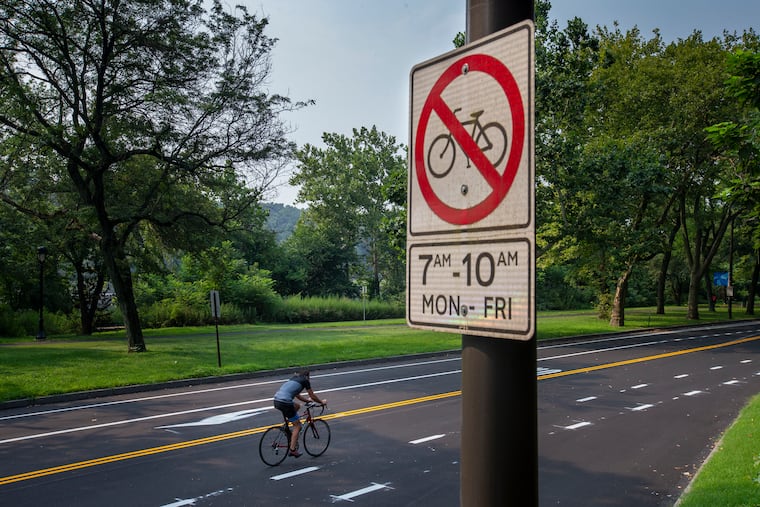Sorry, Philly, it’s time to stop fighting for bike lanes | Opinion
I’m tired of pretending that they’re the solution when they’re not. They’re too small and too dangerous. There aren’t enough of them, and there never will be.

It’s bad enough to have to ask how a dead rat got painted into a bike lane on Martin Luther King Drive. But it’s worse to have to ask whether that’s supposed to be a bike lane in the first place.
”If these are bike lanes, I wouldn’t recommend anyone use them,” tweeted the Bicycle Coalition of Greater Philadelphia’s Randy LoBasso when they first appeared. The narrow lanes are peppered with drainage grates and at times put cyclists mere inches from highway-speed traffic. One southbound portion pins riders between MLK and the I-76 Expressway for two full miles, before ending abruptly and forcing a merge with traffic.
The city says they’re bike lanes, but only for “experienced” riders who feel “comfortable” tangling with cars. The BCGP calls them “shoulders” and has warned cyclists to stay out of them when MLK traffic returns.
So maybe they’re lanes. And maybe they’re not. Either way, when I saw them, I thought, that’s it; if the bike lane is trying to kill me, then the bike lane must be dead.
And then I thought: You know what? Good riddance. Enough with bike lanes.
I’m tired of pretending that they’re the solution when they’re not. They’re too small and too dangerous. There aren’t enough of them and there never will be, no matter who promises what.
And why not? After a lifetime of riding, my conclusion: Bikes aren’t useful enough to enough people. Hills, distances, weather, deadly traffic — these aren’t minor concerns. Philly is home to 900,000 jobs, but only about 14,000 people bike to work regularly. We’ll never boost those numbers by much when all we have are skinny little paint strips filled with parked cars and potholes.
We need bigger, wider, safer lanes that are better protected from gas-powered traffic. For that, cyclists need allies. The terrible state of the few lanes we have tells me that much.
So I propose we join the Battery Age.
It’s time to stop talking about bike lanes, and start talking about e-lanes. Or b-lanes. Or bike-and-battery lanes. Or Personal Transit Lanes, or Multi-Use Lanes. Call them whatever you want, but get more Americans into them: on their scooters, on their motorized skateboards, on their folding minibikes, on anything that can help us drag Philadelphia into the 21st century.
It doesn’t delight me to say this. I love my bicycle. I ride hundreds of miles a year for work, errands, and (lots of) pleasure. I’ve been doing it since the Schuylkill River Trail was a weedy gravel path. Battery bikes are new on the scene, and truth be told, so far they don’t make great trail companions. E-vehicles tend to roll faster than most of us ride. They’ll snout up silently behind you, then whir past, often while the rider stares at a cellphone.
So yeah: annoying. But the more I see of these increasingly popular vehicles, the more interested I am in their potential, and I’m clearly not alone. Americans now buy an e-bike every minute, more than double the pre-COVID rate. In Philly, Indego riders choose e-bikes three times more frequently than old-fashioned bikes. Across the city, I now see residents of every race, age, and mobility level experimenting with bikes and scooters of all kinds. They can be powerful enough to carry you across town, and still small enough to fold up and carry up to an apartment.
They’re not just entertainment. These vehicles can cheaply and reliably get people to work or school. This is game-changing transit tech: affordable, accessible, powerful, and versatile.
Make no mistake: Any kind of bike is useful in Philly. From my home in West Philly to anything in or near Center City, biking is faster, cheaper, and more predictable than driving or public transportation. Parking, traffic jams, stalled trolleys, late buses — not my problem. How many Philadelphians can say that?
Biking in Philly is also incredibly fun. It’s a delight to explore our neighborhoods, parks, cemeteries, riverfronts, and the unmatched Fairmount Park trails. Our region’s transit advocates deserve all the credit for making the city as relatively bike-friendly as it is.
But biking requires time, money, and fitness. Those things aren’t evenly or equitably distributed in our town.
Also required: courage. I left three teeth on Logan Circle last fall, courtesy of a driver behaving badly. So far this year, 44 people have died in Philadelphia traffic, including 15 pedestrians and four cyclists.
So for most Philadelphians, bikes serve as occasional recreation at best. That means support for our bike lanes has always been limited, and that helps explain their sorry state. I recently chatted about all this with a health-care worker I know: lives in Fishtown, commutes to Center City. She bikes occasionally, but it’s dangerous — “cars are crazy,” she said — and also hard work.
But an electric bike or scooter would be perfect for the three-mile commute, she said. You can zip past clogged traffic and through dicey intersections. You can cruise pleasantly along the waterfront. On most days, she said, riding an e-bike would be faster, cheaper, more reliable, and far more pleasant than driving or taking SEPTA.
“I wish I could ride one to work,” she said. “That would be awesome. And my boyfriend wants one too.”
Yes, there should be speed limits. No, they shouldn’t be allowed on every trail. And no, they’re not necessarily reducing anybody’s carbon footprint. But batteries are the future. We need to build for them, and not just because those scooters and skateboards are going to use our bike lanes anyway.
It’s because they can help our city grow.
Bill Hangley Jr. is a freelance journalist based in Philadelphia. @hangleyjr